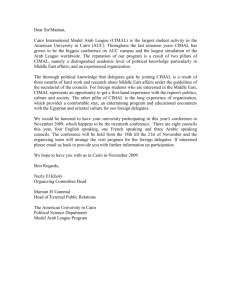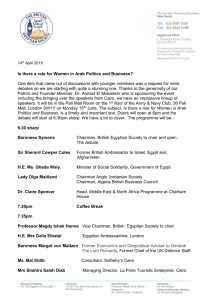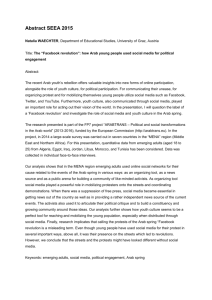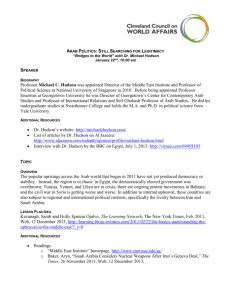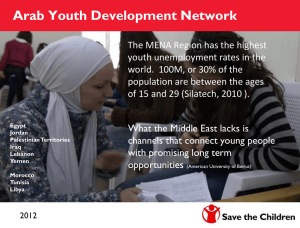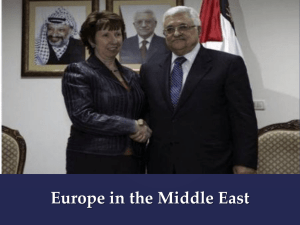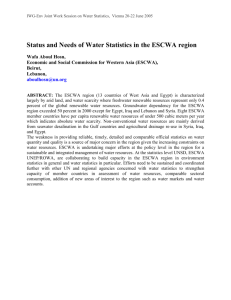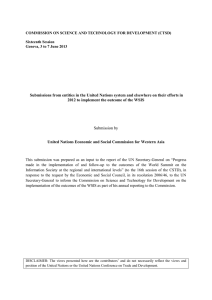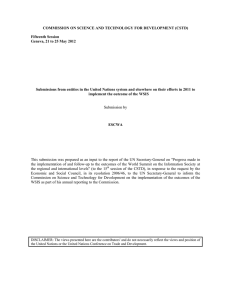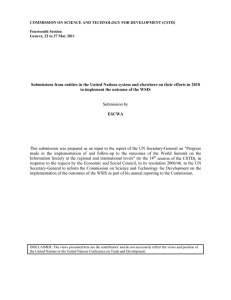The Arab Regional Conference Program - UN
advertisement
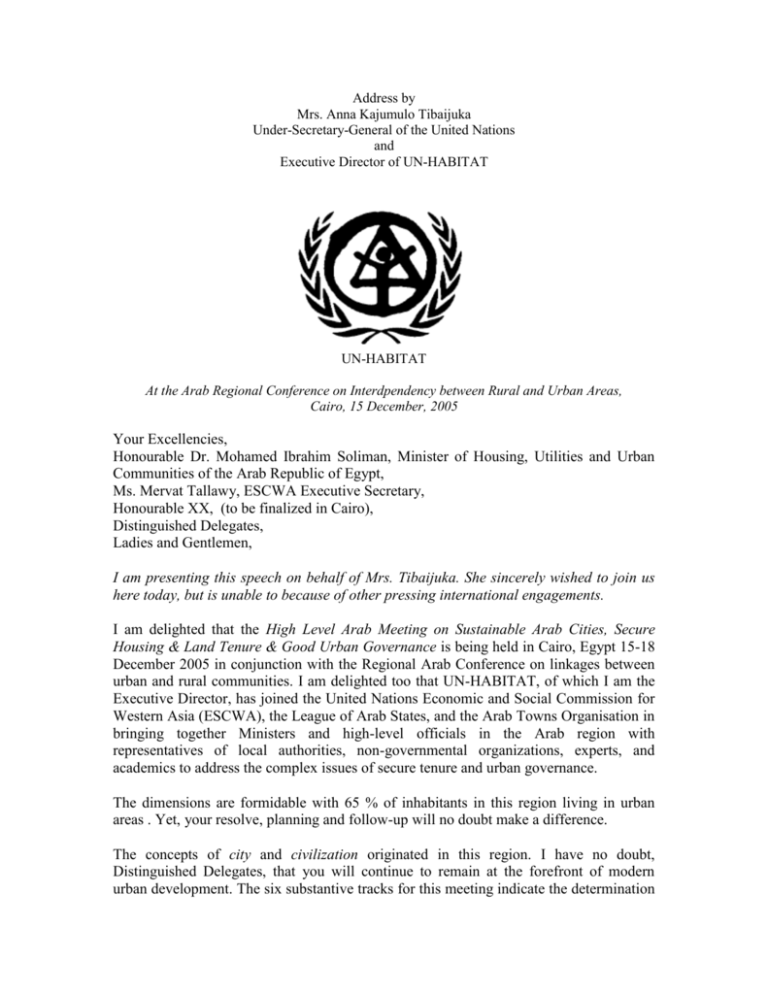
Address by Mrs. Anna Kajumulo Tibaijuka Under-Secretary-General of the United Nations and Executive Director of UN-HABITAT UN-HABITAT At the Arab Regional Conference on Interdpendency between Rural and Urban Areas, Cairo, 15 December, 2005 Your Excellencies, Honourable Dr. Mohamed Ibrahim Soliman, Minister of Housing, Utilities and Urban Communities of the Arab Republic of Egypt, Ms. Mervat Tallawy, ESCWA Executive Secretary, Honourable XX, (to be finalized in Cairo), Distinguished Delegates, Ladies and Gentlemen, I am presenting this speech on behalf of Mrs. Tibaijuka. She sincerely wished to join us here today, but is unable to because of other pressing international engagements. I am delighted that the High Level Arab Meeting on Sustainable Arab Cities, Secure Housing & Land Tenure & Good Urban Governance is being held in Cairo, Egypt 15-18 December 2005 in conjunction with the Regional Arab Conference on linkages between urban and rural communities. I am delighted too that UN-HABITAT, of which I am the Executive Director, has joined the United Nations Economic and Social Commission for Western Asia (ESCWA), the League of Arab States, and the Arab Towns Organisation in bringing together Ministers and high-level officials in the Arab region with representatives of local authorities, non-governmental organizations, experts, and academics to address the complex issues of secure tenure and urban governance. The dimensions are formidable with 65 % of inhabitants in this region living in urban areas . Yet, your resolve, planning and follow-up will no doubt make a difference. The concepts of city and civilization originated in this region. I have no doubt, Distinguished Delegates, that you will continue to remain at the forefront of modern urban development. The six substantive tracks for this meeting indicate the determination of the countries in this region to tackle the challenges. We are to assess the status of housing and land tenure and good urban governance; to develop the regional campaigns for Secure Tenure and Good Urban Governance; to evaluate the internatinal response to UN-HABITAT’s global campaigns in the region; to further develop national initiatives in these areas; to review the sustainability of Arab cities; and to strengthen co-ordination among the ESCWA countries, partners and all stakeholders. This high level meeting builds on the outcomes of the previous Meetings, in Cairo two years’ ago, and in Beirut in July last year. From the 1995 Rabat Declaration on Sustainable Human Settlement Development, to the 2000 Bahrain document on basic principles and procedures for the implementation of the Habitat agenda in the Arab region (Istanbul + 5) and several recent initiatives, this region has made subtantive headway in addressing the daunting challenges of rapid urbanisation. We are at the threshold of a successful culmination of the first phase of our jointly initiated regional campaigns. Today, we are not merely considering the fruitful results of the first phase but doubly anticipating the intensification of Arab efforts at forceful, decisive implementation of the agreed principles under the campaigns for Secure Tenure and Urban Good Governance. These are reflected in our commitments to inclusiveness, transparency, decentralization, and participation, as well as access to land for the poor, promotion and protection of the rights of women and protection from forced illegal evictions. This High Level Meeting and its various seminars are aimed at encouraging ESCWA member States, to implement the regional campaigns at the national level. I am pleased that this meeting is forthright in recognizing the need to further build political commitment and develop a synergy of actions, participatory planning and decision-making among national governments, local authorities, civil society organizations and the private sector in the region. Distinguished Ladies and Gentlemen, It is most apt that this meeting is taking place in Cairo, one of the greatest megacities of the world, a cradle of urban civlisation that will remain home millions more in generations to come. The words of the Arab Historian Ibn Khaldun on Cairo in 1382 echo in my mind: This is the metropolis of the universe, the garden of the world. How you have managed the staggering growth and achieved such significant results, we would like to learn from you. Last year, I had the privilege of presenting the UN-HABITAT’s Sroll of Honour Award to the people of Lebanon and its late Prime Minister, Mr. Rafik Hariri as a shining example of post-conflict urban reconstruction. Our efforts in other conflict countries such as Palestine and Iraq need to be redoubled. It was Morocco, in collaboration with UNHABITAT, which launched the first global campaigns in the Arab world in conjunction with a bold Cities without Slums programme and which continues to takes giant strides towards upgrading 200,000 slums by 2010. Many of your achievements are an inspiration for similar initiatives across the world. The rest of the world too has much to learn from the remarkable best practices of this region. I note that in addition to the meeting’s objectives of analysis and review of the campaigns, we are focusing on the development of practical methodologies, standards and technical measures to be used as tools to confront major challenges encountered by ESCWA countries. UN-HABITAT will be your partner here. UN-HABITAT seeks also to recognize the strengths and specific heritage in the areas of security of tenure, sustainable land practices and good governance. Recently, UNHABITAT commissioned a research study on concepts and practices in this region relating to a range of subjects including land law, land tenure, access to land for all, endowments (waqf) and financing. These can serve as an inventory of practices, successes and challenges specific to this region. We are pleased to participate in your efforts by bringing to this meeting expertise and ideas that can be discussed openly towards achieving better clarity and understanding of potential innovative land tools. We are also, through these workshops, seeking your inputs for the World Urban Forum meeting at Vancouver, Canada next year, as well as your important participation in the pro-poor Global Land Tool Network. The 2005 Millennium Project Report charts the progress made in the region, including the momentum towards achieving Development Goal 7, Target 11 to achieve significant improvement in the lives of at least 100 million slum dwellers, by 2020. Highlighting progress and shortcomings, it recognizes that, with respect to progress towards the MDGs, sharp regional and intra-country discrepancies are evident. Yet, as the report indicates, the sharing of resources and expertise is vital in forging strategic global and regional partnerships and formulation of effective macroeconomic and social policies. I am pleased therefore to wish this meeting every success in moving towards achieving greater security of tenure and development for people in this region. My special thanks and appreciation go to ESCWA, the Government of Egypt, the League of Arab States, the Arab Towns Organisation as well as yourselves, Distinguished Delegates. In wishing you every success in your deliberations, I cannot express how delighted I am to be associated with your important initiatives. And so I close by assuring you of UNHABITAT’s full support in your efforts.

